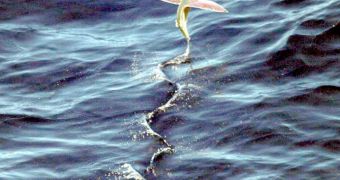In a new study, researchers determined that flying fish indeed fly and glide just as efficiently as birds do. The data could allow experts to gather more data on the impressive creatures.
Flying fish are very peculiar animals, because they are the only aquatic species that can fly. Conversely, there are many species of birds that can dive and swim underwater.
Biologists know that these impressive fish can stay aloft for more than 40 seconds. They can cover distances spanning more than 400 meters in a single go, and reach a top speed of 70 kilometers per hour.
Seoul National University mechanical engineers Haecheon Choi and Hyungmin Park decided to investigate the animals in closer detail after Choi became fascinated with them while reading a children's book.
Much to their surprise, the experts determined that flying fish can glide surprisingly well, almost identical in performance levels to birds.
Data on their research was published in the September 10 issue of the Journal of Experimental Biology.
But before the experts could derive the new data, they had to try something that was never attempted before, and namely test the flying creatures inside a wind tunnel.
That proved to be an enormously complex task, given the high level of logistics complexity involved.
First of all, the team needed the fish, and so they made an agreement with the National Federation of Fisheries Cooperatives of Korea. This allowed the experts access to 40 darkedged-wing flying fish.
Five exemplars of nearly-identical size were selected, and were then stuffed, with their wings in various positions. Some were stretched all the way, others partially, and other not at all.
They were then taken to the Korean Research Center of Maritime Animals, where they were tested in a wind tunnel. Sensors installed on their bodies measured lift, drag, and other flight-related parameters.
The final results showed that the fish glided better than most insects, and nearly as good as bird species including petrels and wood ducks.
It was additionally discovered that the fish which had their wings swept back for the study were very unstable in this configuration.
This shows in turn that the animals are extremely well adapted to living in two totally different environments, e! Science News reports.

 14 DAY TRIAL //
14 DAY TRIAL //